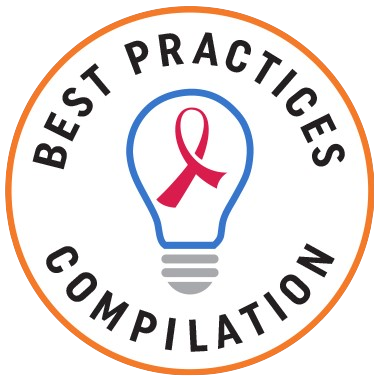In 2017, the Rutgers New Jersey Medical School created a transgender health program and integrated it into their Infectious Disease Practice (Rutgers IDP). The program conducted community outreach to engage transgender men and women in care, trained all staff on gender affirming care, hired transgender staff, provided gender affirming care and hormone treatments onsite, and offered mental health support to patients.
Newark, NJ
Transgender women in the United States are 34 times more likely to have HIV than the general population, and those who are engaged in HIV care have lower retention in care and viral suppression rates. Focus groups conducted by Rutgers with transgender people to assess their medical needs and experiences found that provision of gender-affirming hormone therapy was a main priority. Prior to implementation of the program, transgender patients at the Rutgers IDP had to access gender-affirming hormone therapy only through other providers by referral. Programs that integrate gender-affirming practices and hormone therapy to address the complex medical and social needs of transgender persons can lead to better HIV prevention and treatment outcomes.
Gender-affirming hormone treatments are now provided onsite at Rutgers IDP. Prior to the integration of the transgender health program, the IDP’s clinical providers did not provide gender-affirming hormone treatments to transgender patients, and referred patients elsewhere for these services.
Clinical providers were educated on providing gender-affirming care and hormone therapy by accessing training from the National LGBTQIA+ Health Education Center at the Fenway Institute, going to conferences, and reviewing published endocrinology guidelines. All staff were trained on the use of pronouns and the transgender experience.
Through partnerships with local LGBTQIA+ organizations such as the African American Office of Gay Concerns, and community-based organizations such as the North Jersey Community Research Initiative, as well as state funding of two community health worker staff who are both transgender women, Rutgers IDP has been able to reach out to transgender individuals in the community and bring them into care at the practice.
The program has a commitment to increase hiring of transgender staff. They have hired a community health worker and a peer educator who are both transgender women.
The mental health social worker received additional training and certification on the mental health care needs of transgender and non-binary persons. This enabled the social worker to provide more effective mental health support and referrals for patients, and also to provide clinical supervision for the community health worker and peer educator.
Referrals to social and behavioral health services are made for patients with unstable housing, food insecurity, substance use disorders, and other critical needs.
“As an HIV primary care clinic that was addressing all of our patient's other needs, including managing hypertension and diabetes and hyperlipidemia and cancer screenings, we wanted to be able to integrate gender-affirming hormone therapy into our primary care as well.”
From January 2017 to September 2019, the team collected data on patient outcomes along the HIV care continuum for transgender women participating in the transgender health program.
| Category | Information |
|---|---|
| Evaluation data | HIV care continuum data from January 2017 to September 2019. |
| Measures | Prescription of ART, retention in care, viral suppression. |
| Results |
Prior to the program, retention in care for the seven transgender women with HIV seen at the clinic was 43% and viral suppression was 57%. By September 2019, 28 transgender women with HIV were seen at the clinic: 100% were prescribed ART, 95% were retained in care, and 86% had reached viral suppression. |
Source: Outcomes of a Transgender Health Program Integrated into HIV Prevention and Care. National Ryan White Conference on HIV Care & Treatment 2020 poster.
“We found that outcomes across the HIV care continuum can be enhanced for transgender women by addressing unmet medical and social needs. Our findings highlight the importance of comprehensive gender-affirming care in efforts to engage transgender women into HIV prevention and treatment."
- Community engagement. Prior to program implementation, community outreach and focus groups were conducted to assess community priorities and needs.
- Gender affirming care protocols. New clinical and non-clinical protocols were developed to support the provision of gender-affirming care.
- Transgender staff. Transgender peers with lived experience were hired to inform program implementation and provide services for transgender patients.
- Gender-affirming forms and medical records. All patient forms and medical records were revised to capture gender identity, pronouns, and preferred name in addition to patient’s date of birth, preferred language, vital signs, PHQ-2 score, and reason for visit.
- Staffing model. The staffing model included existing staff—clinical providers, the mental health social worker and program administrator—each devoting several hours a week to transgender health services. In addition, a community health worker (1 FTE) and a peer educator (1 FTE) were hired as new positions to support the transgender health program.
The transgender health program is now fully integrated into the Rutgers IDP.
“The program has become part of the fabric of our practice and continues to grow.”
- Ongoing staff training is needed. In addition to the initial training (see Core Elements), Rutgers IDP continues to provide training updates at monthly staff meetings. The Rutgers IDP has also created a podcast for staff on the difference between sex and gender, what gender identity and gender expression means, and how to ensure respectful use of pronouns and names.
- Leadership support for all-staff training on pronouns and gender-affirming care best practices is crucial.
- Specificity and transparency regarding the roles and responsibilities of all staff is important. This includes ensuring that support and supervision is in place for all peer staff, as peers share many experiences with the patients, including experiences of trauma.

